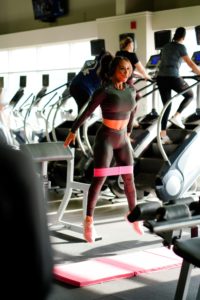You know physical exercise is good for you. You’ve been told this countless times by your primary care physician, the television media, and even your high school gym teacher. But actually, scheduling and starting a workout is a great deal harder than what people tell you. There’s work to be done, a job to go to, dishes to wash. What you need is workout motivation and inspiration that will get you started and keep you going on your fitness journey. Irvine Christian Counseling can help you build the mental and emotional discipline needed to stay committed to your health goals, creating a balanced approach to physical and mental well-being.
Does Working Out Really Help?
Exercise gives you both physical and mental health benefits. Depending on the types of exercise you choose and your goals, you can improve your health, stave off injuries, and increase longevity.
 The U.S. Department of Health and Human Services and the President’s Council on Sports, Fitness, and Nutrition advise that adults should aim to exercise 150 minutes per week (moderate-intensity activity) or 75 to 150 minutes per week of intense (vigorous) activity spread throughout the week. For example, you could take a brisk walk 30 minutes a day five days a week. Or, you could take a high-intensity kickboxing class for 40 minutes twice a week.
The U.S. Department of Health and Human Services and the President’s Council on Sports, Fitness, and Nutrition advise that adults should aim to exercise 150 minutes per week (moderate-intensity activity) or 75 to 150 minutes per week of intense (vigorous) activity spread throughout the week. For example, you could take a brisk walk 30 minutes a day five days a week. Or, you could take a high-intensity kickboxing class for 40 minutes twice a week.
People who cannot meet these guidelines should try to increase their movement throughout the day such as parking further away in a parking lot, walking around the grocery store, or simply focusing on arm and abdomen exercises while sitting in a chair.
Physical Benefits of Exercise
The physical benefits of exercise go beyond improving appearance. It can also:
- Reduce blood pressure levels
- Reduce cholesterol levels
- Strengthen the heart
- Strengthen the lungs
- Strengthen muscles and bones
- Improve flexibility
- Reduce injuries by improving balance
- Reduce the risk of Type II diabetes and some cancers
- Lower body fat percentage
- Increase muscle mass
- Reduce BMI (body mass index measurement)
- Reduce overall body weight and size
- Improve endurance
You feel and move differently when you exercise consistently. You will notice that reaching for things and lifting heavier objects becomes easier. When you begin to experience the benefits of physical activity, you will want to continue, which can also increase your workout motivation.
Mental Benefits of Exercise
 Not only will you reap the physical rewards of exercise but working out gives you an emotional and mental boost as well. How’s that for workout motivation?
Not only will you reap the physical rewards of exercise but working out gives you an emotional and mental boost as well. How’s that for workout motivation?
The mental benefits of exercise include:
- Releasing endorphins – the “feel good” chemicals
- Increasing neural growth in the brain
- Reducing inflammation in the brain
- Alleviating depression
- Decreasing anxiety
- Relieving stress and headaches
- Strengthening the ability to focus and concentrate
- Helping with the symptoms of PTSD (post-traumatic stress disorder) and the nervous system
- Boosting self-confidence
- Providing more restful sleep
- Increasing energy
The mental benefits of working out are available to you without spending hours in a gym or running multiple marathons. You can reap the benefits with a variety of exercise methods, so choose the one you will stick to (and love).
Types of Exercise
A good exercise regimen incorporates a variety. Your body needs aerobic exercises for your heart, flexibility training to keep you safe, bone and muscle-strengthening movements to protect your bones, and functional movements to make daily tasks easier. Although this may sound like a lot of working out, you can find exercises that serve more than one purpose.
Aerobic Exercise
Aerobic exercise, also referred to as cardiovascular exercise or cardio, strengthens your heart and lungs. Your cardiovascular system moves nutrients, oxygen, carbon dioxide, and hormones throughout your body. A healthy cardiovascular system means a reduced risk for heart disease, stroke, high blood pressure, congestive heart failure, and artery diseases.
Examples of aerobic exercise include walking, running, biking, swimming, kickboxing, boxing, dancing, hiking, and cardio machines (like the elliptical or treadmill).
Flexibility Training
 When we don’t maintain a consistent stretching and flexibility schedule, the muscles tighten and shorten. This decreases your range of motion, making it more likely that you will injure yourself. You should consider stretching after any type of exercise. Some people find that stretching before bed relieves any tension from the day.
When we don’t maintain a consistent stretching and flexibility schedule, the muscles tighten and shorten. This decreases your range of motion, making it more likely that you will injure yourself. You should consider stretching after any type of exercise. Some people find that stretching before bed relieves any tension from the day.
Examples of flexibility training include static stretching (holding still), ballistic stretching (moving to reach the stretch), passive/active stretching, isometric stretching (tensing the muscle without moving), and proprioceptive neuromuscular facilitation (PNF, stretching that incorporates static, active, and isometric movements.
Strength Training
Strength training is critical for keeping the muscles, bones, ligaments, and tendons healthy and strong. The U.S. Department of Health and Human Services and the President’s Council on Sports, Fitness, and Nutrition suggest that adults strength train at least twice a week at a moderate to greater intensity.
Examples of strength-training methods include weight machines, free weights (dumbbells, barbells, kettlebells), and body-weight resistance exercises.
Balance and Functional Training
Balance exercises improve stability and decrease your likelihood of falls. This is important especially if you are older. Seniors have an increased risk of falling, so balance training is critical. Functional training teaches your body to efficiently activate different body parts to keep your balance.
For example, if you squat and then take a step to the right, you are activating several muscle groups at once while trying to stabilize your core and stay upright.
Balance and functional training include yoga practice, Tai Chi, some Pilates movements, and poses that shift your weight.
Practices like yoga and Pilates work in some body-weight resistance, flexibility training, and balance movements into each session. There might also be a cardio component added to a Pilates session depending on the type of Pilates. Some teachers combine yoga, Pilates, weights, and cardio into new methods to provide their students with a well-rounded practice. Ask your local studio, fitness center, or community center about the types of workout classes offered.
How to Find Workout Motivation
The good news: you can find workout motivation everywhere.
- Fitness Quotes – you can find quotes on Pinterest and Instagram. Print a few out that resonate or use them as the screensaver on your phone.
 Music Playlists – you can easily create playlists on iTunes, Spotify, or Amazon Music. Choose upbeat tunes to keep you pushing through your workout.
Music Playlists – you can easily create playlists on iTunes, Spotify, or Amazon Music. Choose upbeat tunes to keep you pushing through your workout.- Fitness Blogs and Vlogs – there are several popular fitness bloggers and vloggers online. Choose a couple that you like and follow them for advice (but don’t play the comparison game).
- New Workout Clothes – you may wear mostly baggy sweats to workout in right now but consider purchasing a new outfit. Simply dressing the part can motivate you.
- New Workout Gear – fitness trackers have come a long way. Anytime we purchase a new device, it seems like we can’t wait to take it out for a spin. Think about upgrading to a new tracker, bike, running shoes, or yoga mat.
- Fitness Community – sometimes it’s better to share the fun (and struggle) with others. Join a fitness community either in person or online. It’s a great way to meet people and develop new friendships.
- Fitness Goals – setting specific fitness goals can inspire you to consistently workout. For example, you can choose to train for an upcoming 5K or commit to working towards a fitness certification (even if you don’t plan to teach).
- Tracking Progress – tracking your daily habits can keep you motivated. Choose a planner where you can record your goals, workouts, water intake, and food intake.
- Documenting Results – keep track of your results through pictures and measurements. You could record a weekly vlog or blog post, take progress pictures, and track your measurements and weight monthly.
- New Fitness Programs – sometimes all it takes is a new program to motivate you. Consider signing up for a new class, streaming a fitness program at home, or downloading a 30-day fitness calendar.
- A Big Shiny Reward – nothing motivates like a gold star. Break down your goal into increments and assign rewards for each milestone. For example, perhaps you reward yourself with a gift card to your favorite store after you complete 30 Pilates sessions.
On those days when you still don’t feel like you have anything left in you, choose to exercise for five minutes. You can march in place, do a high-intensity interval circuit, or a short yoga session. After five minutes, you will feel accomplished that you met the goal, and more than likely, you will want to continue for a bit longer. You will become your own workout motivation.
Christian Counseling for Workout Motivation
Believe it or not, Christian counseling can play a role in increasing your workout motivation. If you’re looking for some professional help, feel free to contact me or one of the other therapists in the counselor directory to schedule a risk-free initial appointment. Irvine Christian Counseling offers a supportive and faith-based approach to help you stay motivated and focused on achieving both your fitness and personal well-being goals.
“Stretching”, Courtesy of Scott Broome, Unsplash.com, CC0 License; “Resistance Exercise”, Courtesy of Guillaume Bolduc, Unsplash.com, CC0 License; “Jogging”, Courtesy of Curtis MacNewton, Unsplash.com, CC0 License; “Friends”, Courtesy of Helena Lopes, Unsplash.com, CC0 License
-
Dr. Joe Raphael: Author
With God’s help, we will work together to better understand and resolve the current challenges in your life to give you hope for a more fulfilling and meaningful future in Christ. Some common concerns that my clients share include dealing with stress...
-
Kate Motaung: Curator
Kate Motaung is the Senior Writer, Editor, and Content Manager for a multi-state company. She is the author of several books including Letters to Grief, 101 Prayers for Comfort in Difficult Times, and A Place to Land: A Story of Longing and Belonging...
DISCLAIMER: THIS ARTICLE DOES NOT PROVIDE MEDICAL ADVICE
Articles are intended for informational purposes only and do not constitute medical advice; the Content is not intended to be a substitute for professional medical advice, diagnosis, or treatment. All opinions expressed by authors and quoted sources are their own and do not necessarily reflect the opinions of the editors, publishers or editorial boards of Irvine Christian Counseling. This website does not recommend or endorse any specific tests, physicians, products, procedures, opinions, or other information that may be mentioned on the Site. Reliance on any information provided by this website is solely at your own risk.






